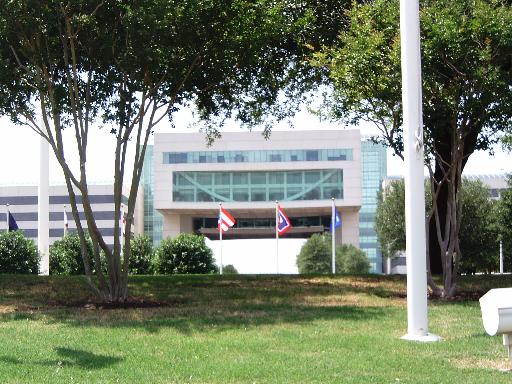Ross Perot founded Electronic Data Systems (EDS) in Dallas in 1962, transforming Texas into a tech hub. With just $1,000 in savings, Perot pioneered fixed-price data processing contracts, securing major clients like Collins Radio and Frito-Lay. EDS’s disciplined corporate culture and innovative business model disrupted the industry before GM’s $2.5 billion acquisition in 1984.
The company’s dramatic growth laid the foundation for Texas’s evolution into the technology powerhouse you know today.
H. Ross Perot’s Vision: From IBM Salesman to Tech Pioneer
Five years into his successful career at IBM, H. Ross Perot identified an opportunity that would transform him into one of the world’s most influential tech entrepreneurs. In 1962, he founded Electronic Data Systems (EDS), offering data-processing services at competitive prices—a revolutionary concept at the time.
Perot’s approach was methodical and disciplined. He implemented a strict corporate culture that prohibited alcohol and mandated conservative attire, establishing a distinctive company identity.
His innovative business model centered on 5-year fixed-price contracts for data-processing systems, securing Collins Radio as EDS’s first major client, followed by Frito-Lay Corporation in 1963.
This pioneering strategy not only launched EDS to prominence but ultimately helped establish Texas as a significant technology hub. EDS’s success contributed to the state’s evolution into what is now a global tech center, with over 867,000 tech professionals representing 6.2% of Texas’s workforce.
The Birth of a Texas Tech Giant (1962)
When H. Ross Perot incorporated Electronic Data Systems on June 27, 1962, he wasn’t just starting a company—he was launching a technological transformation in Texas. After hitting his sales ceiling at IBM, Perot’s entrepreneurial mindset led him to create a business offering affordable data-processing services through a then-novel strategy: 5-year fixed-price contracts.
EDS quickly secured its first customer, Collins Radio in Iowa, followed by a pivotal long-term contract with Frito-Lay in 1963. Perot’s approach brought real disruption to the computing industry. He created a disciplined environment with conservative dress codes and alcohol prohibition.
Much like Atlassian’s later product-led growth strategy, EDS emphasized value delivery that fueled substantial growth. This foundation would help EDS dominate niche sectors like insurance data processing by 1990.
Early Client Wins That Changed the Industry
Though starting with just one employee and $1,000, EDS quickly built client relationships that reshaped the tech services industry. Their first major breakthrough came with Collins Radio in Cedar Rapids, establishing EDS’s reputation in manufacturing sector data processing.
EDS’s client expansion was rapid—from signing Frito-Lay Corporation in 1963 to becoming the insurance industry’s largest data processor through their work with Mercantile Security Life. By 1990, they dominated insurance processing services.
Their regulatory adaptability was clear when Medicare legislation passed in 1965. EDS swiftly organized nationwide claims-processing systems, later applying this model to sectors like brokerage firms in the 1970s—positioning the company as a trailblazer in tech services.
Just as Texas Instruments shifted from oil exploration to semiconductors under Patrick Haggerty, EDS evolved from a startup into a defining force in the tech landscape.
EDS’s Distinctive Corporate Culture and Business Model
At the heart of EDS’s success was a rigorous corporate culture. You wouldn’t find employees drinking at lunch or wearing casual clothes—EDS demanded professionalism, banning alcohol and enforcing formal dress codes.
This discipline extended to their business model. EDS pioneered fixed-price, long-term contracts for data processing services, a groundbreaking idea that offered clients both cost certainty and performance.
Thanks to its technical proficiency, EDS managed to profitably maintain these agreements while expanding into specialized markets, earning a reputation for executional reliability.
Navigating Challenges: Lawsuits and International Tensions
Despite meteoric growth, EDS faced major challenges in the mid-1970s. One came when F. & M. Schaefer Brewing Company sued, alleging EDS’s systems produced inadequate reporting. The dispute ended with a $2.3 million out-of-court settlement, prompting EDS to tighten quality assurance.
Internationally, EDS struggled in Iran. When the Iranian government defaulted on payments, EDS suspended service and evacuated personnel amid rising diplomatic tensions. The situation highlighted the geopolitical risks of international business expansion and the company’s emphasis on employee safety.
The General Motors Acquisition and Its Impact
When General Motors acquired EDS on June 27, 1984, for $2.5 billion, it marked a watershed moment in EDS history. GM kept EDS as a wholly owned subsidiary, preserving continuity in operations and leadership.
The deal catalyzed explosive growth. EDS’s revenues tripled in the first year, and the firm expanded well beyond traditional services. In 1986, Ross Perot exited after GM bought out his special-performance shares.
Under new CEO Lester Alberthal, EDS grew into sectors like transportation, energy, and manufacturing, and opened the Information Management Center in Plano, solidifying its digital infrastructure leadership.
Leadership Evolution and Strategic Shifts
Ross Perot’s 1986 departure ushered in a new era under Lester M. Alberthal, whose leadership balanced innovation and continuity.
Alberthal introduced:
- A leadership council that decentralized decision-making
- A global digital network anchored at Plano’s Information Management Center
- Expansion into systems integration beyond facilities management
- Market diversification across communications, transportation, and energy
These moves yielded immediate results—EDS revenues tripled within a year of the GM acquisition and earned major government contracts like Project Viable.
How EDS Transformed Technology Services in Texas
Texas’s tech industry changed forever thanks to EDS’s innovations. By offering fixed-rate, multi-year contracts, EDS gave clients predictability, which redefined service delivery expectations across industries.
With the 1965 Medicare law, EDS built scalable claims-processing systems, eventually becoming the largest insurance data processor in the U.S. This success laid the groundwork for further entry into sectors like brokerage, utilities, and transportation.
Their Plano Information Management Center became a digital nerve center, anchoring a global client network and elevating Texas as a global tech hub.
Legacy of Innovation: EDS’s Lasting Impact on the Tech Landscape
Beyond profits and contracts, EDS’s legacy lives on in Texas’s tech culture and economy. The company left behind:
- A skilled workforce built through rigorous internal training
- Proven client diversification models across industries
- Global digital infrastructure starting in Plano
- A blueprint for adaptive leadership in tech firms
This systems integration pioneer helped shift Texas from oil to technology, shaping its identity as a world-class innovation center.



